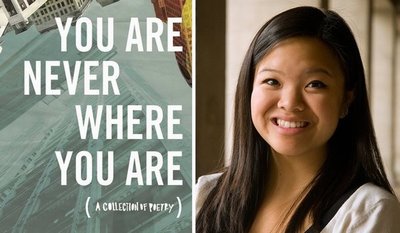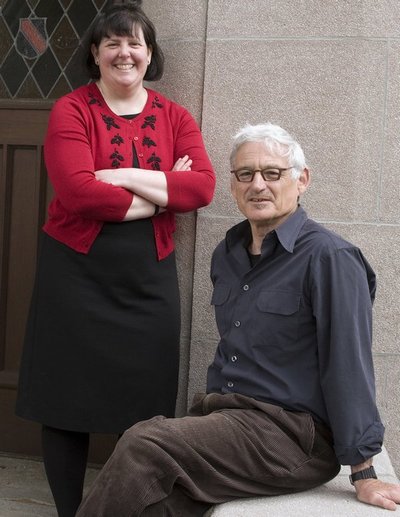June 3, 2010
Next Common Book is UW-created book of 15 poems, ‘You Are Never Where You Are’
The Common Book this year will be a UW original. No, a member of the UW community didn’t pen a book just for the occasion, but a group of faculty, staff and students did select the elements for a collection unique to the University.
The Common Book — that is, a single book that will be read by all incoming freshmen — is made up of 15 poems, each individually chosen by a committee for a book produced by UW Creative Communication. A visual communication design student, Nicole Yeo, designed the cover for the book, which is titled, You Are Never Where You Are. It will be officially launched on Thursday, June 10.
This marks the first time that the book chosen for the Common Book program, now in its fifth year, has been poetry. The idea arose, said committee co-chair Lisa Oberg, out of a desire to do something different this year. “Poetry was one of the ideas that came up, and people just seemed to perk up,” she said.
The committee first considered a book by a single poet, but quickly rejected that idea. Then they began looking at anthologies, but found them “too big and too high school.” That’s when they decided to create their own collection and to keep it small.
But how to sort through the vast universe of poems to select just the right ones for the collection? Initially, committee members brought in their own ideas and sought those of others. The result was about 170 poems. At that point they decided to use a rating system to whittle the list down to 30.
“Then we used a fist to five system,” said co-chair Eugene Edgar. “A poem is named, and if you love it you put up five fingers, if you hate it, you put up a fist. The rule is, if you have anybody with a fist or a 1, you need to have more discussion before you move on.”
And if, after further discussion, the person rejecting the poem was adamant, the poem was out. “We eliminated some poems that some of us really loved, but for the right reasons,” Oberg said.
The committee didn’t start with any preconceived notions, Oberg and Edgar said. They weren’t looking only for Northwest poets or only for UW poets or only those with a certain style.
“The only real criterion was, will [the poem] grab an 18-year-old?” Edgar said.
For Shelby Handler, a student member of the committee, being 18 is a recent experience. “While wading through countless suggestions and long lists, I kept picturing the one-way airplane ticket that took me from home to a new life in Seattle,” she said. She called the transition to the UW “completely frightening and completely exciting,” and said that for every poem the committee picked, she “hoped students might find inspiration, empowerment or at least, a little smile in appreciation for a skillful arrangement of words.”
The committee members did look at such things as the poets’ age, gender and ethnicity as they made their final selections, and they feel they wound up with a good balance. All but three of the chosen poets are still alive. Several poets with UW connections — Colleen McElroy, Heather McHugh, Richard Hugo and Theodore Roethke — are included. Only two — Wislawa Szymborska and Mahmoud Darwish — are not Americans, but several of the others are from multicultural families.
The book’s title, You Are Never Where You Are, is a line in one of the poems, I Saw You Tomorrow, by Alberto Rios. It was chosen largely in response to design ideas put forward by the student designer. “We had come up with some generic titles that really weren’t very provocative,” Oberg said. “Then the student came back with such great ideas for what to do with the cover that the small group from the committee that was working with her started looking at the poems to see whether there were some phrases that spoke to the student experience.”
Yeo, the designer, explained her final design, which she said was meant to echo the freshman experience of moving to a new location and experiencing a new phase of their lives.
“I combined two pictures I shot from different perspectives of the city — one from an alley looking up toward the sky, and one looking down at the city from a higher perspective,” Yeo said. “I felt that the combination of the grey, foggy buildings juxtaposed with the vibrant, energetic bursts of color in the other buildings provokes the idea that dreary circumstances, in a completely different perspective, can be beautiful — it all depends on the way you look at it.”
Beyond that, Yeo said the cover was designed to be appealing to students who are, perhaps, resistant to or disinterested in poetry. “It needed to be edgy, but not obnoxious, beautiful, but not too romantic, approachable, but not boring,” she said. “It needed to be honest.”
Now that the book is a reality, the committee is turning its thoughts to how the volume will be used during the upcoming academic year. Three students on the committee, including Handler, are avid participants in poetry slams, so there are definitely some slams in the works.
“We have a million more ideas than we have time or energy to do,” Oberg said. “But we have so many wonderful local poets here and some wonderful poetry venues so we’re going to be talking about that this summer. We really are trying to seed some events throughout the academic year so that we end up in April, which is National Poetry Month, as a nice capstone.”
The planners are hoping that the launch, which is an invitation-only event to which faculty and staff who interact frequently with freshmen are invited, will get the ball rolling. Incoming freshmen will receive the book free; others can purchase it at University Book Store.
The co-chairs both say the process has been rewarding. Edgar, who is a professor of special education, has been a fan of poetry since he took a reading sabbatical some years ago and read Bill Moyers’ The Power of Language. From that he learned to love Naomi Nye, who is represented in the Common Book, and then moved on to enjoy other poets. He tries to read one or two poems a day.
As for Oberg, she is a health sciences librarian with a degree in microbiology, so reading poetry isn’t something she’d ever thought of doing. “There were some poems that I remembered from high school and college days, but it was a fairly static collection, and the world of poetry has moved on,” she said. “This project has reopened my eyes to the many ways people can be creative.”
The Common Book program is sponsored by Undergraduate Academic Affairs.


